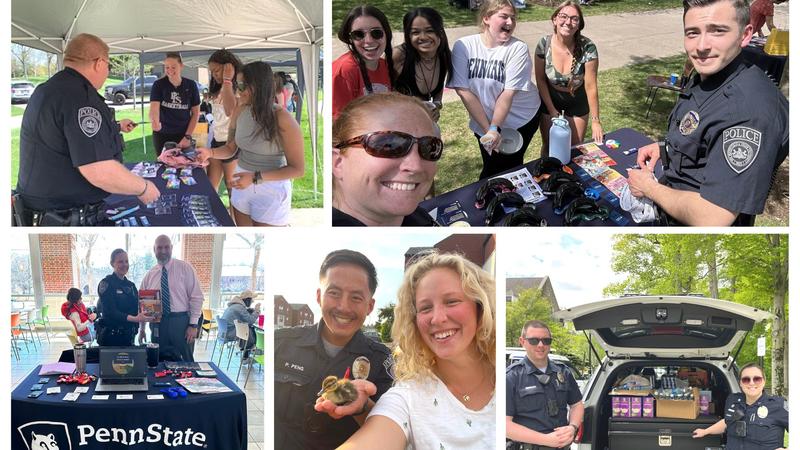Community Oriented Policing

Educational Programs for Work Units and Student Groups
The Community Oriented Policing (COP) Unit is committed to supporting a safe and welcoming campus for all faculty, staff, students, and visitors at Penn State. The unit is responsible for day-to-day community policing tasks across all campuses, including:
- Working with University and local community members to solve identified problems related to quality of life and safety
- Developing and instructing community education programs, geared toward crime prevention, safety, and victim support
- Planning and organizing events with and for community members
- Participating in community discussions and meetings
- Facilitating proactive plans for crime prevention
- Facilitating training for police officers that supports building meaningful and trusting relationships with the community
Collaboration, outreach, and outreach education are key elements in fostering a secure environment where everyone can thrive.
While COP officers manage these tasks and responsibilities day-to-day, these efforts are accomplished with the support of all UPPS employees, because the department recognizes that community policing is everyone's responsibility.
University Police and Public Safety Community Oriented Policing Philosophy
COP Education Programs
A comprehensive selection of education programs are available free of charge for all University student groups and work units, designed to inform the community on numerous safety topics and to engage and safeguard the campus community.
Student groups and work units wishing to schedule an educational program may complete a Community Education Program Request Form.
Available programs include:
- Active Attacker Response Program: This important program provides participants with an overview of the University's Run, Hide, Fight Active Attacker Response Program, designed to educate community members on best practices for maintaining safety should they be faced with an active attacker incident on or off campus. This program complements required student training available at runhidefight.psu.edu.
- Alcohol Awareness: This program provides participants with an overview of the dangers associated with excessive and underage drinking, symptoms and dangers of alcohol overdose, and information on the Pennsylvania Medical Amnesty Law and other relevant Pennsylvania law.
- Domestic Violence Awareness: This program provides participants with a review of signs of domestic and relationship abuse and information on reporting abuse and resources available to victims of abuse.
- Drug Awareness: The program provides participants with an overview of commonly used drugs, their effects on the body, and resources available for addiction treatment and support.
- (COMING SOON) Hazing Awareness and Prevention: This program provides participants with an understanding of what constitutes hazing, the impacts the practice has on all involved, the importance of reporting instances of hazing, and resources available for victims.
- Introduction to Safety at Penn State: This program, intended for International Penn State students (including those who speak English as a second language), provides participants with an overview of University Police and Public Safety and safety resources and guidance at Penn State.
- Pedestrian and Traffic Safety: The program provides an overview of University Policy PS03 (Regulations for Bicycles and Personal Mobility Devices), federal and state laws, and safety tips related to pedestrians, motorists, cyclists, and others traveling across campus.
- Personal Safety and Awareness: This 75-minute program provides participants with an introduction to key strategies for personal safety, including physical resistance strategy.
- Safety and Security for Officer Personnel: This program provides participants with an overview of best practices to promote safety in the workplace and includes guidance on dealing with hostile individuals or active threats and tips for preventing theft and maintaining personal safety.
- Scamming and Phishing Safety: This program offers participants with an overview of current and common scams and phishing schemes, provides practical tips to avoid becoming a victim, and includes information about resources available to support those affected.
- Sexual Assault Awareness and Prevention: This program leads participants in a discussion on sexual assault awareness and prevention tactics for college students, relevant federal and state laws, and available victim resources and support. It explores the importance of communication and consent in relationships and addresses stalking and sextortion.
- Virtual Meeting Safety: This program provides participants with tools and resources available for helping to protect virtual meetings on Teams, Zoom, etc.
- Who We Are and What We Do: This program provides participants with an overview of University Police and Public Safety services and programs and campus safety resources.
For Emergencies, Call 911
